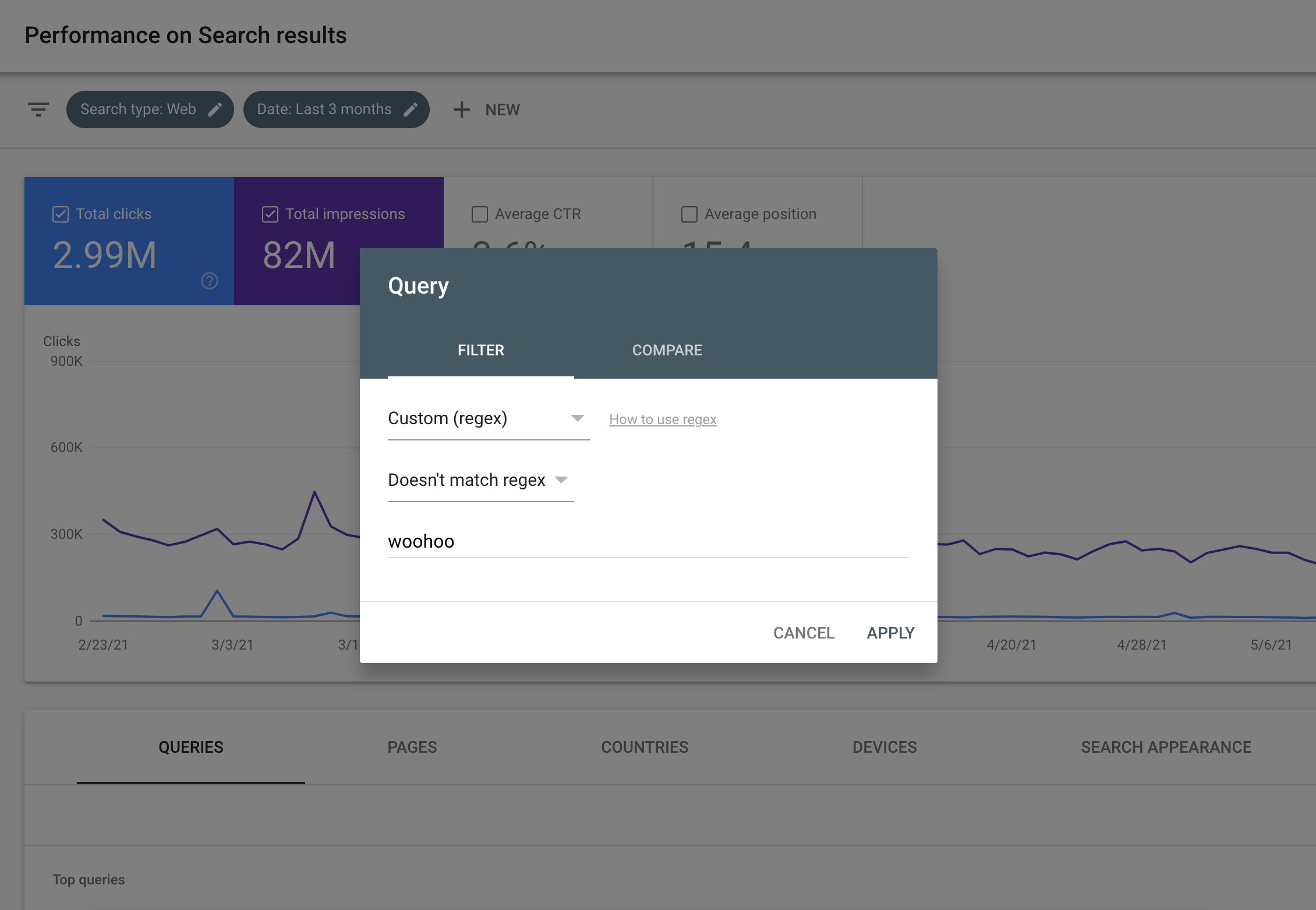Środa, 2 czerwca 2021 roku
Niedawno informowaliśmy o udoskonaleniu filtrowania danych w raportach skuteczności w Search Console. Reakcja społeczności na to ogłoszenie była bardzo pozytywna.
Jak zawsze analizowaliśmy także otrzymane opinie. Dostaliśmy wiele próśb o dodanie opcji dopasowania wykluczającego do filtra wyrażeń regularnych.
Mamy dobrą wiadomość: od dzisiaj filtr raportu skuteczności obsługuje w filtrach wyrażeń regularnych zarówno dopasowanie, jak i brak dopasowania. Opcja jest dostępna w dodatkowym menu, które pojawia się po wybraniu opcji „Niestandardowy (wyrażenia regularne)” w selektorze filtrów – widać ją na zrzucie ekranu poniżej. Więcej informacji o filtrowaniu danych o skuteczności wyszukiwania.

Wskazówki dotyczące używania wyrażeń regularnych w Search Console
Pomyśleliśmy też, że dobrze byłoby przygotować parę krótkich wskazówek dla osób, które dopiero zaczynają korzystać z wyrażeń regularnych.
Po pierwsze, co to jest wyrażenie regularne? Krótko mówiąc, jest to sekwencja znaków określająca wzór wyszukiwań. Używając jej, można tworzyć zaawansowane filtry, które pozwalają uwzględnić lub wykluczyć nie tylko słowo czy wyrażenie. W wyrażeniach regularnych można wstawiać różne metaznaki, które mają specjalne znaczenie, np. definiują kryteria wyszukiwania. W przewodniku po składni wyrażeń regularnych RE2 znajdziesz informacje o wszystkich metaznakach obsługiwanych przez Search Console.
Jeśli zastanawiasz się, kiedy warto użyć wyrażenia regularnego zamiast innych typów filtrów, poniżej przedstawiamy kilka przykładów:
- Segmentacja użytkowników, którzy znają już Twoją markę – użyj wyrażenia regularnego, które określa wiele wariantów nazwy Twojej firmy, między innymi z błędami w pisowni. Dzięki temu dowiesz się, jakiego typu zapytań używają poszczególne grupy i które sekcje Twojej witryny interesują poszczególnych odbiorców.
Jeśli na przykład nazwa Twojej firmy to
Willow Tree, możesz utworzyć taki filtr uwzględniający wszystkie warianty:willow tree|wilow tree|willowtree|willowtee(metaznak|reprezentuje instrukcję OR). - Analizowanie ruchu w sekcji witryny – użyj wyrażenia regularnego, które koncentruje się na konkretnych katalogach w Twojej witrynie. Dzięki temu dowiesz się, jakie zapytania są typowe dla poszczególnych obszarów treści. Jeśli na przykład struktura adresów URL to
example.com/[product]/[brand]/[size]/[color]i chcesz zobaczyć ruch prowadzący do zielonych butów, ale nie interesują Cię rozmiar ani marka, możesz użyć wyrażeniashoes/.*/green(.*to dowolna liczba wystąpień dowolnego znaku). - Zrozumienie intencji użytkownika – użyj wyrażenia regularnego, aby sprawdzić, jakie typy zapytań kierują użytkowników do różnych sekcji Twojej witryny.
Załóżmy, że interesują Cię zapytania zawierające zaimki pytające. Filtr zapytań
what|how|when|whymógłby pokazać wyniki wskazujące, że w Twoich treściach można łatwo znaleźć odpowiedzi, na przykład w sekcji najczęstszych pytań. Innym przykładem mogą być zapytania zawierające (lub nie) słowa związane z transakcjami, takie jakbuy|purchase|order. Dzięki nim możesz sprawdzić, które nazwy produktów są w tych wyrażeniach używane częściej lub rzadziej niż inne.
W Centrum pomocy Search Console znajdziesz przykłady typowych wyrażeń regularnych. Jeśli chcesz podzielić się z nami innymi ciekawymi przykładami użycia wyrażeń regularnych, udostępnij je na Twitterze, używając hashtagu #performanceregex.
Jeśli masz pytania lub wątpliwości, skontaktuj się ze społecznością Centrum wyszukiwarki Google lub napisz do nas na Twitterze.
